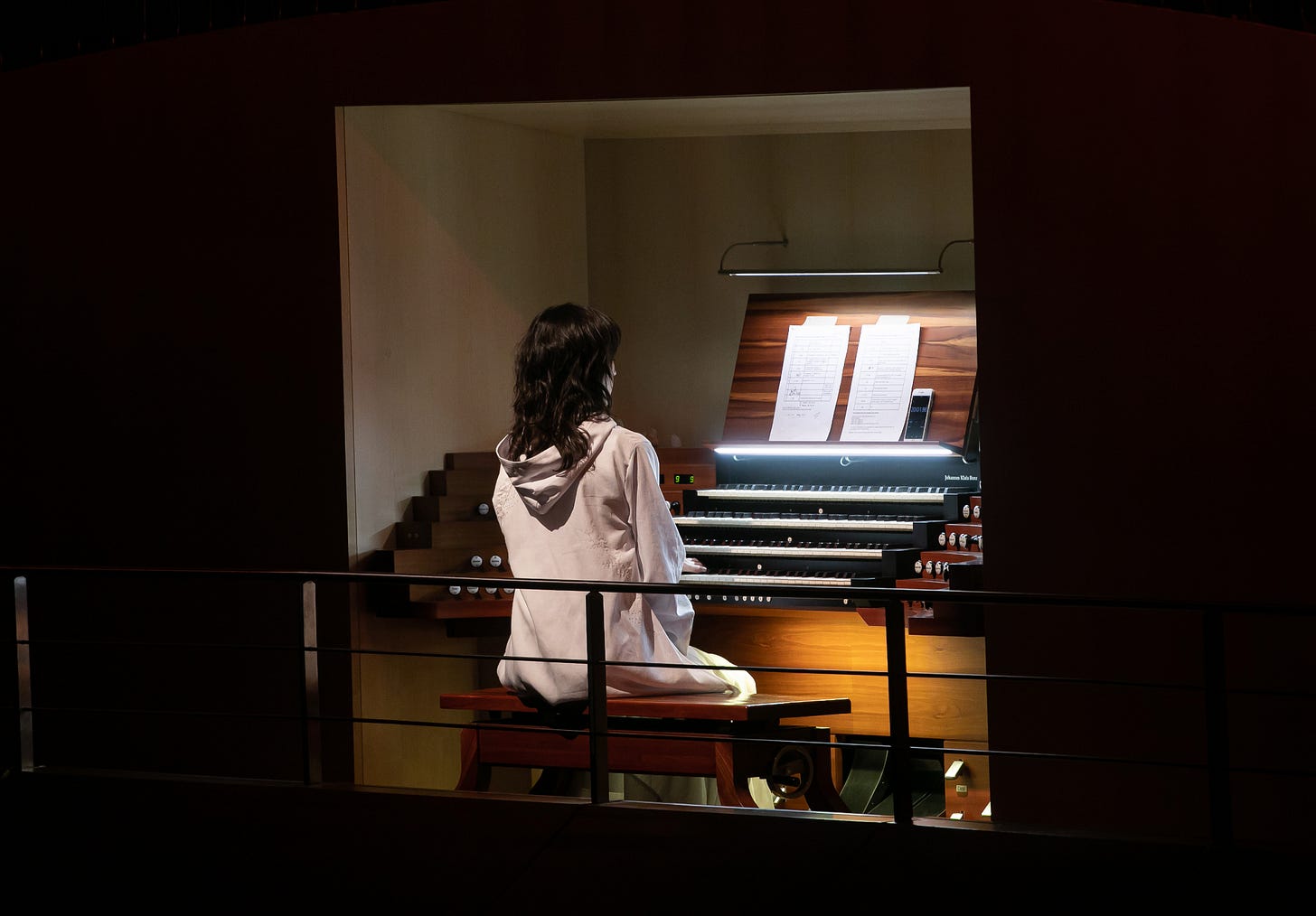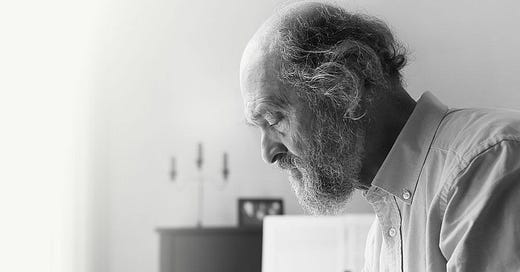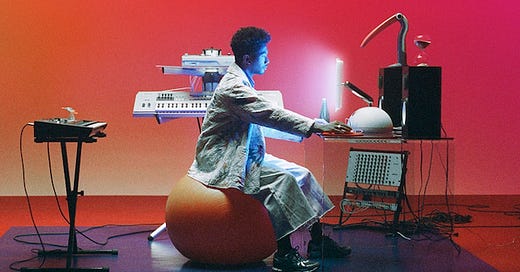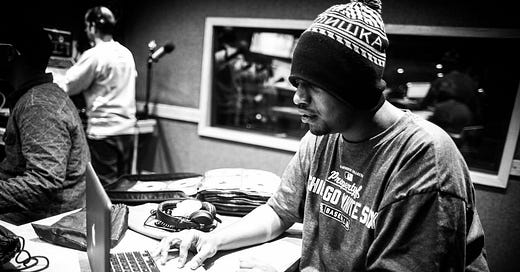
Today we’re listening to Ángeles Rojas, an Argentinian composer based in Berlin. She started piano lessons at age 12 and went on to study composition at the University of the Arts in Buenos Aires. Her music blends instrumental drones with nature sounds. We’re playing two of her entrancing records: Breathe into the Forest… for shruti box and ensemble, and Sometimes I Dream… for “guitars in nature.” Rojas has a deep philosophy behind her art, and her responses to our questions below articulated the ethos behind Flow State better than we ever could. We’ll leave you with one excerpt:
I think that sound is a very direct medium. It has a special way of breaking through concepts and descriptions, which is the more analytical mind, and of moving directly towards the heart, the sensitive mind. Maybe it has to do with the memories that we carry with us. When I was a little girl, I used to go to the stream in front of my house and just spend time there, listening to the water passing through the stones. I also grew up in a very windy region, so the sound of the wind has an inexplicable effect on me. When I hear the trees moving, I feel connected for a moment to a very quiet and calm present, suddenly I’m away from my own thoughts. So this connection I've been exploring doesn't come from any particular piece of music. It just comes from the simple experience of life. Or perhaps from the particular landscape I grew up listening to and that now lives within me.
Breathe into the Forest, Into the Bird, Into the Song - Ángeles Rojas (43m, no vocals)
Spotify / Apple Music / YouTube Music / Amazon Music / Bandcamp / Tidal
Sometimes I Dream of a Place Where You Can Whisper with the Wind - Ángeles Rojas (60m, no vocals)
Spotify / Apple Music / YouTube Music / Amazon Music / Bandcamp / Tidal
What's your earliest memory of music?
I would say my earliest memory is when I was about eight years old. I remember playing music on my older sister's little keyboard. Since I didn't know the names of the notes, I would put colors on each key and later make a kind of score so I wouldn't forget the song.
Tell us about your musical background – when you started studying music and how you started making your own music.
I started studying piano when I was 12, and I remember always improvising and making my own music instead of following a score. In a way, composing has always been a part of me. So I moved to Buenos Aires first to study piano and then composition. I studied composition privately and then at the University of the Arts in Buenos Aires, where I graduated. In those years, I also formed a post-rock/krautrock band where I played keyboards. I would say these experiences influenced my artistic background.
What's your studio setup?
I make music in a very analog way, mainly acoustic, so my studio setup is very simple: two Adam monitors, a big screen, notebooks with my ideas, and lots of books around. I also have instruments: a piano, a shruti box, a tambura, and a synthesizer. And some microphones (Shure SM57 and Audio Technica Pro 35).
You've explored the connection between sound and spirituality. Our hunch is that you were motivated to explore this in part by profound experiences listening to ambient music or sound art. What pieces of music have had the strongest effect on you?
I actually started exploring it naturally, without looking for it. I think that sound is a very direct medium. It has a special way of breaking through concepts and descriptions, which is the more analytical mind, and of moving directly towards the heart, the sensitive mind. Maybe it has to do with the memories that we carry with us. When I was a little girl, I used to go to the stream in front of my house and just spend time there, listening to the water passing through the stones. I also grew up in a very windy region, so the sound of the wind has an inexplicable effect on me. When I hear the trees moving, I feel connected for a moment to a very quiet and calm present, suddenly I’m away from my own thoughts. So this connection I've been exploring doesn't come from any particular piece of music. It just comes from the simple experience of life. Or perhaps from the particular landscape I grew up listening to and that now lives within me. A landscape that I can only listen to when I'm in silence.
You've previously written, "The composer [is] simply a means of that [musical] medium, which through technique and detachment from himself, is capable of giving body to the spirit of an idea that was presented to him." How do you try to put this into practice as a composer yourself?
I think, as with any art, the first thing you learn is the tools you might need to do your work. Once you have spent years learning the technique, you stop being aware of it. Your only work now is just to live and stay open to the seed of an idea. This usually happens when you are doing something else: reading, walking, spending time with friends, cleaning, sleeping. You just have to stay open and attentive. Being porous to encounters with others: a bird eating on the balcony, a ray of light coming through the window, a conversation with a friend. Anything can contain the seed of an idea. It appears unpredictably. Once it does, you just try to follow its natural path. It may take some time to put the clues together. It is like archaeological work. You just have to brush away your extra thoughts and preconceived ideas that come from your own self. You have to be completely available for the other to grow and exist. It's not easy at all, it's like embodying a virus, but in the end it's a really comforting experience. You are there for the other. And you have the tools to create the structure that it needs. Because every living thing needs a place to live. Even the sea has its boundaries. So composing for me is creating the structure that the other needs to exist and grow. And while you play or listen to music that has been built in this way, you also keep an open state to follow how it slowly evolves. For a moment, you are part of its dwelling. Part of something beyond yourself. Isn't that a deep kind of love?
What artists / albums are you listening to the most these days?
I listen to a lot of music and it's very diverse. This week I listened to an album called Bow down thine ear, I bring you glad tidings by Cristian Alvear and D'inicise. I also listened to Golden Pear by Omni Gardens and Love What Survives by Mount Kimbie. I try to listen to Dagar Brothers every day because it makes me feel very good.
How do you listen to music – headphones, speakers, etc.
I usually listen to music through my speakers, which are very good and I think are healthier than using headphones all the time. But when I need a more intimate way of listening, I use my studio headphones. That way I can pay more attention to the details.
Name an underrated artist from the past 50 years.
Sabine Schall. She is not a sound artist, but a visual artist. Yet looking at her paintings is like listening to music or watching a landscape slowly change. The choice of colours, the repetitive patterns and the empty spaces create a continuous composition. She also has very deep insights into life and art.
What are you working on next?
Now I'm rearranging an ensemble piece for a big gong and many instruments that was just played in Oslo. I'm also planning a residency at the PRAH foundation, where I'll finish an album with an Argentinean duo I have, for synthesizers and electric guitar.
















Ángeles’ description of composition as “brushing away your extra thoughts so something else can grow” really struck me — it’s such a tender and honest way to frame creativity. Not as self-expression, but as deep listening. Her metaphor of the composer as a host for something alive, something that needs a structure to exist — that’s a vision of art-making I’ll be carrying with me for a long time. This was more than an interview; it was a meditation. Thank you for this.
Anyone looking to zone out into a hypnotic flow state I recommend listening Dixon's Violin, who came to my home town, Sarasota, Florida, and gave a mesmerizing performance using all improve pedal looping and solo violin musical expression. It was truly beautiful.
https://open.spotify.com/artist/7ECUCqZFq0J4GOHZ7zsi60?si=9gWRQkp3SaCtIQdURbM98g